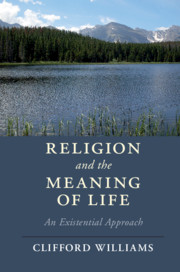Refine search
Actions for selected content:
3 results
4 - Fear of Death and Trauma of Birth
- from Part I - Fin-de-Siècle Vienna
-
- Book:
- Wounded Healers
- Published online:
- 17 December 2020
- Print publication:
- 03 December 2020, pp 55-63
-
- Chapter
- Export citation
3 - Denial of Death
-
- Book:
- Religion and the Meaning of Life
- Published online:
- 23 March 2020
- Print publication:
- 09 April 2020, pp 42-55
-
- Chapter
- Export citation

Religion and the Meaning of Life
- An Existential Approach
-
- Published online:
- 23 March 2020
- Print publication:
- 09 April 2020
